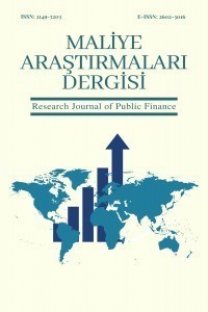TÜRKİYE'DE GELİR VERGİSİNİN ÜCRETLİLER ÜZERİNDE OLUŞTURDUĞU ETKİNLİK KAYBININ ÖLÇÜLMESİ
Optimal vergi politikasında üç eğilim gözlenmektedir. Bu eğilimler; gelirin düz oranlı vergilendirilmesi, yüksek gelire sıfır marjinal vergi oranı uygulanması ve vergilendirmenin dolaylı vergilere kaydırılmasıdır. Bu eğilimlere paralel olarak Türk vergi sisteminin dolaylı vergiler ve ücretliler üzerine kaydığı gözlenmektedir. Türkiye'de gelir vergisinin ücretliler üzerinde oluşturduğu etkinlik kaybı Harberger-Browning kısmi denge analizinden hareketle 2008 - 2014 yılları için hesaplanmaktadır. Hesaplamalarda dikkati çeken en önemli husus işgücü arz esnekliği ve artan oranlılık arttıkça etkinlik kaybının artmasıdır. Asgari ücretliler üzerindeki kaybın çok sınırlı kaldığı görülmektedir. Ücretliler bir bütün olarak dikkate alındığında, özellikle asgari ücretlilerin etkisiyle, etkinlik kaybı hafiflemektedir. Türkiye'de etkin bir vergi yapısı oluşturmak için düşük gelirlilere ve çocuklu ailelere yönelik sosyal yardımlar güçlendirilmeli, ücretlerle birlikte sermaye gelirleri vergilendirilmeli, dolaylı vergiler ''adalet'' açısından yeniden değerlendirilmeli ve detaylı gelir vergisi beyannamesi doldurulmalı ve bu beyannameler istatistiksel olarak sınıflandırılmalıdır.
Anahtar Kelimeler:
Gelir Vergisi, Ücretliler, EtkinlikKaybı
Measurement Of The Efficiency Loss Of Personal Income Tax On Wage Earners In Turkey
Three consequential trends have been observed in the optimal tax policy. These trends are to, first, place a levy on personal income proportionally; second, have a zero marginal tax rate for higher income and last, make taxation shift to indirect taxes. In harmony with these progresses, the Turkish tax system is predominantly made of indirect taxes and personal income tax on wage earners. The efficiency analysis of personal income tax on wage earners in Turkey is measured by means of the Harberger-Browning Partial Equilibrium Analysis for 2008 - 2014. This analysis shows that the higher the elasticity of labor supply and tax progressivity, the higher efficiency loss. It is observed that efficiency loss on minimum wage earners is limited. Moreover, efficiency loss on whole wage earners is eased when taking minimum wage earners into account. Therefore, the position of this paper is to establish an effective tax system in Turkey, by strengthening social assistance for lower income and families with children, levying capital income along with wage income, reviewing indirect taxes in regard to
Keywords:
Personal Income Tax, WageEarners, Efficiency Loss,
___
Aykaç, Gökhan (2016), ''Türkiye İşgücü Piyasası'nın İşgücü Arz Esnekliği: 2003 - 2011'', Ege Akademik http://www.onlinedergi.com/makaledosyalari/51/pdf2016_1_2.pdf ss.13-29. Bakış, Cilt 16, Sayı 1, (05.05.2016)Browninig, Edgar K (1987), ‘‘On the Marginal Welfare Cost of Taxation’’, The American Economic http://www.jstor.org.proxy.library.carleton.ca/stable/pdfplus/1806725.pdf?acceptTC =true&acceptTC=true&jpdConfirm=true (26.12.2013), ss.11-23. No. 1
Bry, Bert (2011), ''Wage Income Tax Reforms and Changes in Tax Burdens: 2000-2009'', OECD Taxation Working Papers, No. 10, http://www.oecd-ilibrary.org (15.12.2015), ss.1-46.
Diewert, W. Erwin ve Denis A. Lawrence (1996), ‘‘The Deadweight Costs of Taxation in New Zealand’’, The Canadian Journal of Economics, Vol. 29, Special Issue: Part 2, www.jstor.org/stable/136126 (01.10.2012), ss.658-673.
Feenberg, Daniel ve Martin Feldstein (1996), ‘‘The Taxation of Two-Earner Families’’, NBER, http://www.nber.org/chapters/c6236.pdf (16.12.2013), ss.39-75.
Gouveia, Miguel ve Robert P. Strauss (1994), ‘‘Effective Federal Individual Income Tax Function: An Exploratory Empirical Analysis’’, National Tax Journal, Vol. 47, No. 2, http://web.b.ebscohost.com.proxy.library.carleton.ca/ehost/pdfviewer/pdfviewer?sid =afdc5844-dd6e-41dd-8eec-38a868e25cfb%40sessionmgr112&vid=2&hid=123 (22.02.2014), ss.317-339.
Harberger, Arnold (1964), ‘‘Taxation, Resource Allocation, and Welfare’’, J. Due (Ed.), The Role of Direct and Indirect Taxes in the Federal Revenue System içinde, Princeton: Princeton University Press, ss.25-80.
Haughton, Jonathan (1998), ‘‘Estimating Tax Buoyancy, Elasticity and Stability’’, EAGER/PSGE-Excise http://www.researchgate.net/profile/Jonathan_Haughton/publication/265409911_ Project, ESTIMATING_TAX_BUOYANCY_ELASTICITY_AND_STABILITY/links/54c0e1e00 cf28eae4a69ecc2.pdf (01.10.2014), ss.1-8.
Hausman, Jerry A (1985), ‘‘Taxes and Labor Supply’’, A. J. Auerbach ve M. Feldstein (Ed.). Handbook of Public Economics içinde. Holland: Elsevier Science Publisher, ss.213-263.
Leibfritz, Willi, John Thornton ve Alexandra Bibbee (1997), ‘‘Taxation and Economic Performance’’, OECD Working Paper, No. 176, ss.1-141.
Maliye Bakanlığı Gelirler Genel Müdürlüğü, Vergi İstatistikleri Yıllığı 1982-1991, Ankara, 1992.
OECD, Revenue Statistics 1965-2014, 2015.
OECD, Taxing Wages 2013-2014, 2015.
Saez, Emmanuel, Joel Slemrod ve Seth H. Giertz (2012), ‘‘The Elasticity of Taxable Income with Respect to Marginal Tax Rates: A Critical Review’’, Journal of Economic Literature, http://www.jstor.org.ezproxy.lib.ou.edu/stable/23269968?seq=1#page_scan_tab_co ntents (17.05.2015), ss.3-50. 50, No. 1
Seater, John J. (1985), ‘‘On The Construction Of Marginal Federal Personal and Social Security Tax Rates in the U.S.’’, Journal of Monetary Economics, Vol. 15, No. 1, http://ac.els-cdn.com.proxy.library.carleton.ca/0304393285900571/1-s2.0- 0304393285900571-main.pdf?_tid=5dbe9e0e-8f9f-11e3-83a8- 00000aacb35f&acdnat=1391740218_682f8f08d980a99876bb2232eb42dae7 (15.01.2014), ss.121-135.
Torres, Carolina, Kirsti Mellbye ve Bert Brys (2012), ''Trends in Personal Income Tax and Employee Social Security Contribution Schedules'', OECD Taxation Working Papers, No. 12, http://www.oecd-ilibrary.org (15.12.2015), ss.1-50.
Tunalı, İnsan ve Cem Başlevent (2006), ''Female Labor Supply in Turkey'', The Turkish Economy The Real Economy, Corporate Governance and Reform, Sumru Altuğ ve Alpay Filiztekin (drl.), London ve New York: Routledge, ss. 92-127.
TÜİK, İstatistik Göstergeler Statistical Indication 1923-2006, Ankara, 2007.
TÜİK, Hanehalkı İşgücü İstatistikleri Household Labor Statistics 2011, Ankara, 2012.
Üngör, Murat (2013), ''Some Thoughts Experiments on the Changes in Labor Supply in Turkey'', TCMB Working Paper No: 13/14, http://www.tcmb.gov.tr/wps (17.04.2015), ss.1-21.
Ünlükaplan, İlter ve İbrahim Arısoy (2011), ''Türkiye Ekonomisi İçin Efektif Vergi Oranlarının Hesaplanması'', Ege Akademik Bakış, C.11, S.1, ss.15-24.
Vermeend, Willem, Rick Van Der Ploeg ve Jan Willem Timmer (2008), Taxes and The Economy, 1st Edition, England: Edward Elgar Publishing.
Yüncüler, Burcu Gürcihan ve Çağlar Yüncüler (2016), ''Minimum Wage Effects on Labor Market http://www.tcmb.gov.tr/wps (05.06.2016), ss.1-37. in Turkey'', TCMB Working Paper No: 16/14
- ISSN: 2149-5203
- Yayın Aralığı: Yılda 2 Sayı
- Başlangıç: 2015
- Yayıncı: PESA
Sayıdaki Diğer Makaleler
Mehmet Zeki AK, Nurullah ALTINTAŞ
TÜRKİYE'DE GELİR VERGİSİNİN ÜCRETLİLER ÜZERİNDE OLUŞTURDUĞU ETKİNLİK KAYBININ ÖLÇÜLMESİ
VERGİ VE SOSYO-EKONOMİK GELİŞMİŞLİK İLİŞKİSİ: AFYONKARAHİSAR ÖRNEĞİ
OSMANLI KLASİK DÖNEM MALİYESİ VE MALİ ZİHNİYETİNİN 11. SINIF TARİH DERS KİTABINA YANSIMASI
TÜRKİYE'DE GELİR VERGİSİNİN ÜCRETLİLER ÜZERİNDE OLUŞTURDUĞU ETKİNLİK KAYBININ ÖLÇÜLMESİ
